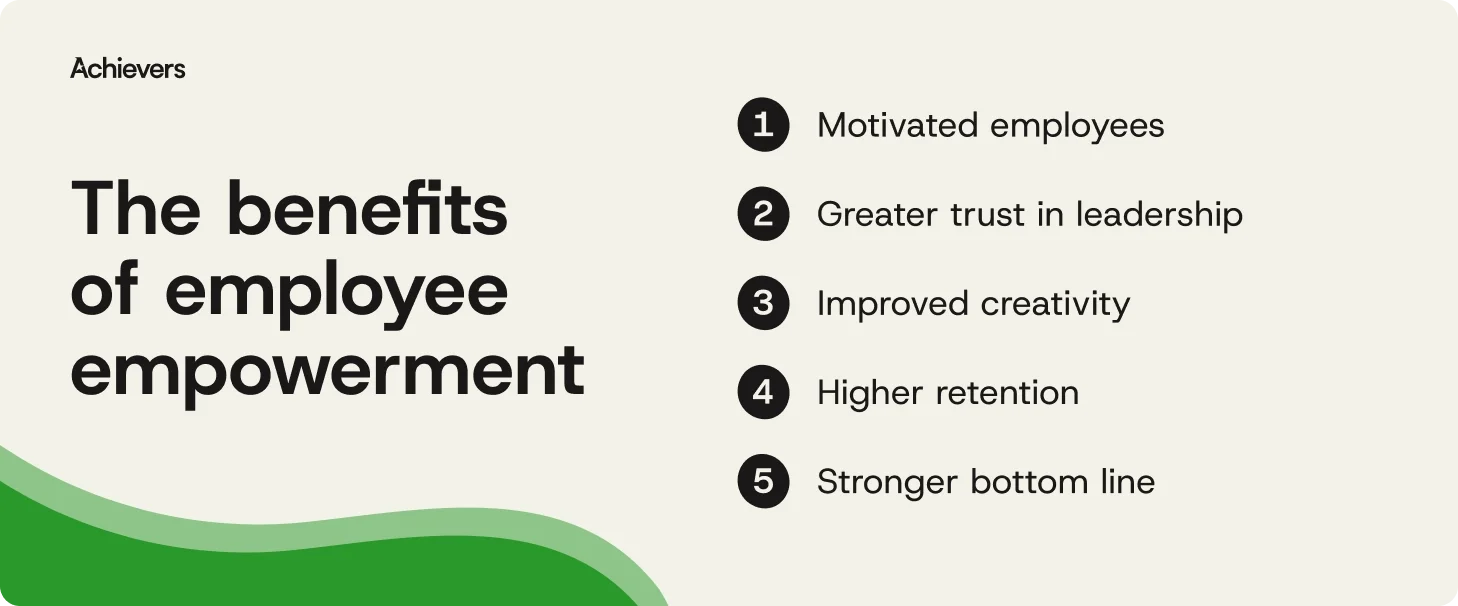Table of contents
Create a culture that means business™
Schedule a demo with an Achievers solution expert today.
What’s the value of employee empowerment? You could say it’s the difference between a team that’s energized and one that’s just getting by. In a study from Zenger Folkman of more than 7,000 employees, those who felt empowered ranked in the 79th percentile for engagement — while their less-empowered peers landed at just the 24th percentile. That’s a wide gap, and it says a lot about the role empowerment plays in driving performance.
When people feel trusted, capable, and supported, they’re more likely to bring their best to work — not just once, but consistently.
So, what does employee empowerment look like in action — and how can you make it part of your everyday culture? Let’s break it down with practical strategies, clear benefits, and real ways to put empowerment into motion.
What is employee empowerment?
Employee empowerment is what happens when you trust people to do the jobs you hired them to do — and give them the freedom, tools, and support to do it well. It’s the antidote to micromanagement, and a fast track to better engagement, innovation, and accountability.
If you want to empower your employees, start here:
- Listen and act: Ask for feedback regularly — and more importantly, follow through. When employees see change happening because of their input, they know their voice matters.
- Create room to grow: Stretch assignments, expanded responsibilities, or new roles help employees build confidence and capability. Give people chances to step up — and watch what happens.
- Recognize often: Empowerment thrives on appreciation. Frequent, specific recognition reinforces what great work looks like and motivates people to keep showing up strong.
- Set people up for success: Clarity goes a long way. Make sure employees have the training, resources, and decision-making authority they need to move forward without roadblocks.
What are the 5 points of employee empowerment?
The core of employee empowerment comes down to five essentials:
- Create a culture of trust and psychological safety where people feel safe to speak up and take risks.
- Use recognition to build confidence and reinforce the behaviors you want to see more of.
- Give employees flexibility in how, when, and where they work — and trust them to manage it.
- Ask for feedback often, and more importantly, act on it.
- Support continuous growth through coaching, development, and stretch opportunities.
What are the benefits of employee engagement?
When employees feel empowered, they don’t just get more done — they think bigger, contribute more, and choose to stay right where they are. And while that might sound like a lofty goal, the impact is real and measurable. When people feel trusted and ready to take the lead in their work, the ripple effects touch everything from morale to your bottom line.
Here’s what a culture of empowerment can do for your organization:

1. Motivated employees
When people have ownership over their work, they care more about the outcome. Autonomy builds accountability — and with it, a sense of pride in getting things done well. It also helps protect employees against the dreaded workplace burnout, giving them the space to manage their workload in a way that works for them.
2. Greater trust in leadership
No one trusts a boss who hovers. Empowerment flips the script, positioning leaders as coaches who support, guide, and celebrate progress. That trust lays the foundation for stronger teams — and fewer skipped one-on-ones.
3. Improved creativity
Micromanagement kills innovation. Give employees space to try, fail, learn, and try again. When people know their ideas are welcome, they’ll bring their best thinking to the table — not just the safe stuff.
4. Higher retention
People don’t leave great jobs — they leave rigid systems that stifle them. Empowered employees are more likely to grow with your company because they see a future that includes them.
5. Stronger bottom line
Here’s the reality: disengaged employees cost businesses trillions. Empowered employees, on the other hand, boost productivity, drive better customer experiences, and reduce costly turnover. Turns out, trust is pretty good for revenue.
4 steps for empowering employees in the workplace
Creating a culture of empowerment doesn’t happen overnight — but it also doesn’t have to be complicated. With a few focused strategies, you can build a workplace where employees feel trusted, valued, and ready to take the lead. Here’s where to start:
1. Show that feedback matters
Asking for feedback is step one. Acting on it is what actually builds trust. Use tools that surface real-time insights, then follow through visibly so employees know their voice shapes the workplace. Empowerment starts when people feel heard — and believed.
2. Recognize to empower
Recognition is more than a pat on the back — it’s a proven way to build confidence and motivation. Make recognition specific, frequent, and tied to your values. Peer-to-peer, manager-led, or company-wide, it all counts. Frequent recognition is what makes employees feel more productive and like they truly belong.
3. Provide opportunities for professional growth
Empowerment and growth go hand in hand. When employees have room to learn, stretch, and take on new challenges, they build confidence and stay engaged. Offer clear development paths, hands-on experience, and support through coaching or mentorship. This is especially important for women in the workplace, LGBTQ+ employees, and other underrepresented groups, where advancement hasn’t always been prioritized. A culture of learning shows employees you’re invested in their future — not just their output.
4. Make empowerment part of your culture
Empowerment grows through everyday actions — not just big initiatives. It’s reflected in how teams collaborate, how leaders listen, and how ideas are welcomed. Think onboarding buddies, cross-functional collabs, mentoring circles — small shifts that build a culture of shared ownership.
Empower your employees with recognition
If you want employees to take ownership, speak up, and drive results — start by recognizing their impact. Empowerment begins when people feel seen, supported, and confident that their contributions matter.
That’s where Achievers comes in. Our science-backed recognition platform is designed to make recognition consistent, values-aligned, and easy to scale across your organization. With real-time feedback, personalized rewards, and data-driven insights, Achievers helps you turn everyday moments into powerful motivators.
Recognition fuels empowerment — and empowered employees move your business forward. If you’re ready to build a culture where people feel valued, trusted, and equipped to lead, it starts here.



